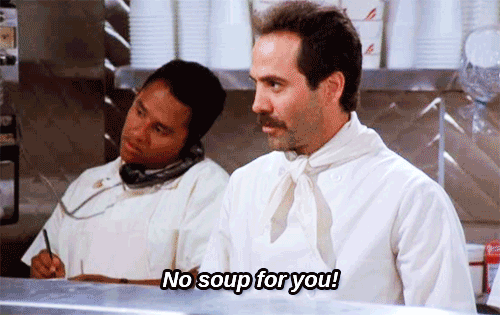Five things Seinfeld can teach you about the law
There seems to be something of a Seinfeld revival in the air. I’m thinking the not-a-reunion on Curb Your Enthusiasm, Larry David’s appearances on Saturday Night Live, Jason Alexander reviving the Jerry and George shtick in Jerry’s Cars-Rich-People-Own web series and the custom-framed Seinfeld emoji poster I have in my office and at my mum's house in Australia. As a Seinfeld fan, I could not be happier.
Seinfeld, for those of you born before, or after, the early 80s and who didn’t have the benefit of watching re-runs on Channel Ten while doing your calculus homework, was a show ‘about nothing’. This is the typical description of the show. I tend to think of it as a show about neurotic thirty-somethings in New York in the 90s, which makes it very much a hokier, more male-focused version of Girls.
The premises in the show were often dilemmas you face as you grow into an adult. Who of us can’t remember the first time you experienced your dinner party host neglecting to bring out your marbled rye? As a former lawyer, I have come to recognise that a lot of these scenarios are governed by the law. Following are five examples of what would have happened if the characters were more litigious and took care to enforce their legal rights.
(Note: my legal interpretations are intended to be light-hearted. If you have a different interpretation, good for you.)
1. Retaking the Rye-bread
The Constanzas visit the Rosses, who, as well as failing to serve cake with the end-of-dinner coffee, refuse (I’m on the Constanzas’ side) to serve the bread that the Constanzas brought to dinner. Frank, incensed about the refusal, takes the loaf back when leaving.
The loaf of bread is a gift. Once delivered, and even though without any explicit consideration (eg, money or a promise in return), it becomes the property of the recipient. In that way, Frank was not entitled to take the rye back just as he was not entitled to take the bottle of wine Mrs Ross was drinking.
Frank, being a person well aware of social customs, perhaps too aware, would argue that the rye was not a gift. It was given on the condition that the bread would be offered during dinner and also in exchange for the performance of the dinner obligations, which included pleasant conversation and cake served with coffee. As those things did not occur, property in the bread never passed to the Rosses.
VERDICT: if your guest gives you something consumable upon arriving at a party you are hosting, you better offer it around.
2. The Armani Suit
Bania: You didn’t think I was really going to give you a suit, did you?
Kramer: What, you’re giving him this suit?
Bania: That’s right, and it’s an Armani.
Kramer: Armani? Hey, Armani Jerry. (Kramer takes the suit and looks it over)
Jerry: Yes, yes, I heard.
Kramer: Come on, try it on.
(Kramer takes the jacket off of the hanger and put the pants, still on the hanger, on the kitchen counter — he opens the jacket for Jerry to slip into)
…
Jerry: All right, all right. (trying on the suit jacket)
…
Kramer: Oh boy, that looks great. I can’t believe you’re giving him this.
…
Bania: I don’t even want anything for it.
…
Kramer: He’s very generous, isn’t he?
Jerry: Yes, yes, he is.
Bania: I’ll tell you what — you can take me out to dinner sometime.
(Jerry starts taking the jacket off and stops — looking very surprised at Bania)
Jerry: Dinner?
Bania: Yeah. You buy me a meal — you can’t get a better deal than that (pats Jerry on the shoulder)
Kramer: No, you’ll never get a better deal than that.
Kenny Bania delivering the Armani suit to Jerry
In short, the ‘deal’ Jerry struck with Bania is an enforceable contract. There was an offer by Bania, a suit for dinner, acceptance by Jerry (albeit reluctant), and manifested intention by both to enter into legal relations. Jerry could argue that there was no intention, but the clarity of the essential terms of the transaction and Bania’s description of the transaction as a deal supports it. There might also have been an absence of intention if Jerry and Bania were closer friends, rather than begrudging acquaintances.
Jerry seems to be aware of all this, and for that reason, offers Bania a soup and sandwich, after also having had a consommé with Bania at Mendy’s.
VERDICT: don’t accept gifts from people who like to eat soup.
3. Cheapskate Wedding Invitations
Bonus lesson. Never use anything but self-adhesive envelopes.
Somehow, George finds himself in a relationship he doesn’t want to be in (who hasn’t been in that situation before?) Somewhat of a cheapskate, he chooses the cheapest wedding invitations available. His fiancee, Susan Ross, responsible for sending out wedding invitations, dies after ingesting too much of the toxic adhesive while sealing envelopes. Is George guilty of any crime? To be convicted of homicide, a person needs to perform the act that causes the death (actus reus) and needs to have the requisite guilty mind (mens rea).
VERDICT: don’t agree to marry people if you aren’t willing to pay for decent wedding invitations.
Also, I should note in George’s defence that he considers himself not to be a cheapskate: https://www.youtube.com/watch?v=j8Zitlri79s
4. Shoddy NYU student-journalism
Elaine notices the woman sitting behind George is eavesdropping on their conversation and discreetly alerts Jerry and George. She decides to add some spice to the conversation. She makes sure to say it loud enough so that the spy at the next table is sure to hear…
Elaine: Y’know, just because you two are homosexuals, so what? I mean you should just come out of the closet and be openly gay
(Jerry rolls his eyes and turns away in disbelief while George on the other hand addresses Jerry directly:)
George: So, whaddya say? You know you’ll always be the only man I’ll ever love.
Jerry: [indignantly] What’s the matter with you?
George: [quietly] C’mon, go along…
Jerry: I’m not goin’ along. I can just see you in Berlin in 1939 goose-stepping past me: “C’mon Jerry, go along, go along…”
All of this is overhead by an NYU journalism student who later interviews Jerry and publishes an article outing him. Could Jerry sue NYU for libel? Having worked on one libel suit in my 8 year career, I have no idea, but will try to answer the question anyway.
The statement was published to third parties and assuming being outed as homosexual is damaging to a person’s reputation (I actually wonder whether this will change given society’s greater acceptance of sexual preference), the statement was defamatory.
The key issue is whether it is open to the journalist to rely on the defence of fair comment/honest opinion. Given that Jerry admits that people think he is homosexual (‘cuz I’m single, I’m thin and I’m neat’), NYU may succeed in this defence as the opinion was honestly held and at least in the world and time depicted in the show, there was a reasonable basis for the opinion.
VERDICT: never go along with jokes made by your friends in public.
5. The Soup Nazi
After Elaine is denied soup for unnecessary small talk while ordering, including a pretty bad Al Pacino Scent of a Woman impression, she publishes the Soup Nazi’s recipes that she finds in an antique armoire (this is French for fancy wardrobe). The Soup Nazi’s business, well, as a soup Nazi, is ruined as a result.
The recipes are in the nature of trade secrets. “5 cups chopped porcini mushrooms, half a cup of olive oil, 3 pounds celery” is a mere listing of ingredients, and isn’t sufficiently artistic to constitute a literary expression which would attract the protection of copyright law. The Soup Nazi therefore has no legal recourse against Elaine to recover the loss caused by her publication of his recipes.
VERDICT: store your recipes securely on the cloud (Dropbox or Google Drive) and not in armoires.
H/t credit to this Eugene Volokh blog post. Although I had conceived of this idea prior to the blog post — he published it well before I had found a vehicle through which to publish these ideas.




